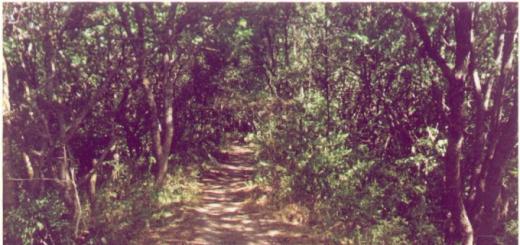It's tremors and vibrations earth's surface resulting from sudden displacements and ruptures in the earth's crust or upper mantle and transmitted to long distances in the form of elastic vibrations. The point in the earth's crust from which seismic waves diverge is called the hypocenter of an earthquake. The place on the earth's surface above the hypocenter of an earthquake at the shortest distance is called the epicenter.
The intensity of an earthquake is estimated on a 12-point seismic scale (MSK-86), magnitude is used for the energy classification of earthquakes. Conventionally, earthquakes are divided into weak (1-4 points), strong (5-7 points) and destructive (8 or more points).
During earthquakes, glasses burst and fly out, objects lying on them fall from the shelves, bookcases stagger, chandeliers sway, whitewash crumbles from the ceiling, and cracks appear in the walls and ceilings. All this is accompanied by a deafening noise. After 10–20 seconds of shaking, tremors intensify, resulting in the destruction of buildings and structures. Just a dozen strong shaking destroys the entire building. On average, an earthquake lasts 5−20s. The longer the concussions last, the more severe the damage.
How can you prepare for an earthquake?
Think in advance of a plan of action during an earthquake when you are at home, at work, in the cinema, theater, on transport and on the street. Explain to your family members what they should do during an earthquake and educate them on first aid.
Keep documents, money, a flashlight, and spare batteries handy.
Have a supply at home drinking water and canned food for several days.
Move beds away from windows and exterior walls. Fasten cabinets, shelves and racks in the apartments, and remove heavy objects from the upper shelves and mezzanines.
Store dangerous substances (toxic chemicals, flammable liquids) in a safe, well-insulated place.
All residents should know where the switch, main gas and water taps are located in order to turn off electricity, gas and water if necessary.
How to behave during an earthquake?
Feeling the vibrations of the building, seeing the swinging of lamps, falling objects, hearing the growing rumble and the sound of breaking glass, do not panic (from the moment you felt the first tremors to vibrations dangerous for the building, you have 15 - 20 seconds). Quickly exit the building, taking documents, money and essentials. When leaving the room, go down the stairs, not the elevator. Once on the street - stay there, but do not stand near buildings, but move to an open space.
Stay calm and try to calm others down! If you are forced to stay indoors, then stand in a safe place: against an internal wall, in a corner, in an internal wall opening, or at a bearing support. If possible, hide under a table - it will protect you from falling objects and debris. Stay away from windows and heavy furniture. If you have children with you, cover them with yourself.
Do not use candles, matches, lighters - if gas leaks, a fire may occur. Stay away from overhanging balconies, cornices, parapets, beware of broken wires. If you are in a vehicle, stay out in the open but do not leave the vehicle until the jolt has stopped. Be ready to help in saving others.
What to do after an earthquake?
Provide first aid to those in need.
Free those caught in easily removable blockages.
Be careful! Ensure the safety of children, the sick, the elderly. Calm them down. Don't pick up the phone unless absolutely necessary. Turn on the radio. Obey the instructions of local authorities, the headquarters for the elimination of consequences natural disaster.
Check for damage to electrical wiring. Repair the problem or turn off the electricity in the apartment. Remember that in case of a strong earthquake, the electricity in the city is turned off automatically.
Check for damage to the gas and water lines. Troubleshoot or disconnect networks. Do not use open fire. Going down the stairs, be careful, make sure it is strong.
Do not approach obviously damaged buildings, do not enter them. Be prepared for strong aftershocks, as the first 2 to 3 hours after an earthquake are the most dangerous. Do not enter buildings unless absolutely necessary. Do not make up or pass on any rumors about possible aftershocks. Use official information. If you find yourself in a blockage, calmly assess the situation, if possible, provide yourself with medical assistance. Try to establish contact with people outside the blockage (voice, knock). Remember that you can not light a fire, you can drink water from the toilet bowl, and pipes and batteries can be used to signal. Save your strength. A person can go without food for more than a crescent.
Any natural disasters cause panic among the population. In order to avoid wrong actions, each person must know how to behave during such situations. One of the most common is an earthquake. It is impossible to prevent it, but you can save your life. The main thing is not to succumb to public panic and maintain a sober mind. But in order to understand what to do during an earthquake, you need to know what this cataclysm is.
More about the phenomenon
Earthquakes occur due to vibrations and shocks of the Earth's surface, they are caused by tectonic processes or can be provoked during a strong explosion. In fact, such phenomena occur quite often on our planet, but not all lead to catastrophic consequences. Many occur under the thickness of the oceans, and we simply do not feel them. In any case, everyone should know what to do in case of an earthquake. It depends on the correctness of actions whether you save your life or not.
Some earthquakes under water cause strong tsunamis, which fall with powerful force and claim millions of lives. Mankind will never be able to control geophysical planetary processes. That is why there are services that monitor the development centers of a future catastrophe and take appropriate measures to save the population.
Classification of earthquakes depending on the points

There is a specialized earthquake scale that measures magnitude and intensity. The latter is calculated by points, which are set from deformation earth's crust and the degree of destruction of surface buildings and structures. Consider a more detailed twelve-point Mercalli scale:
- 1 - Such shocks are completely unnoticed by people, only high-precision devices react to minor fluctuations in the earth's crust.
- 2 - Fluctuations are felt by residents of high-rise buildings. The rest will not pay attention to such a phenomenon.
- 3 - Noticeable vibration occurs on the last floors of a high-rise building. Chandeliers can swing, water in a glass trembles. A parked car will activate the alarm due to noticeable vibrations.
- 4 - Can be described as a moderate earthquake. Everyone who is in the room will definitely feel the movement of the earth's plates. Doors and windows begin to loosen, and glass emits a characteristic rattle. This is especially noticeable in the middle of the night, many wake up.
- 5 - Such an earthquake does not go unnoticed, everyone feels the vibrations of the earth's surface. In many apartments, cracks appear on the windows, objects fall from the shelves.
- 6 - Fluctuations cause public panic. Everyone begins to run out into the streets, and pieces of furniture move around the apartment on their own. Heavy objects fall from shelves. Even the trees emit a characteristic rustle of leaves, the crackling of trunks is heard.
- 7 - A strong enough earthquake that knocks a person down. Many buildings are covered with cracks, unstable ground collapses. The water in lakes and rivers is sharply cloudy from the silt raised from the bottom. Furniture breaks, dishes break.
- 8 - An earthquake that destroys buildings. The branches on the trees break, the ground cracks underfoot.

- 9 - A catastrophic situation during which buildings are destroyed and a lot of people die. Dams collapse, water pipes burst under pressure.
- 10 - The earth is not just shaking, it is moving, and entire cities are collapsing. As a rule, a couple of hours before the disaster, animals begin to panic, which foresee an imminent death. Huge cracks form in the soil, water splashes out of rivers and lakes. The rails are deformable.
- 11 - Almost all buildings are destroyed, only a few buildings manage to resist. Railway tracks are deformed for kilometers.
- 12 - A real disaster that destroys all life. Even riverbeds are changing, and out of the blue, fountains start gushing out of the ground. Completely new lakes are formed, the landscape is transformed beyond recognition.
The higher the scale of earthquakes, the more difficult it is to correct the consequences. During big catastrophes, entire cities perish, people are left homeless. Their houses turn into ruins, and from under the rubble, rescuers still get the bodies of the dead for a long time.
How is magnitude determined?

The magnitude of earthquakes is established on the basis of the received data on the exact measuring instrument- seismograph. Its more common name is the Richter scale. It was developed back in 1935, and has since been widely used by specialists around the world. It is the amount of energy that is released during a catastrophe that is taken into account in this scale.
Below are the main numbers by which the magnitude of any earthquake is determined:
- 2.0 - very weak tremors that not all residents can notice;
- 4.5 - moderate ground vibrations, causing the movement of objects and minor damage;
- 6.0 - shocks of such force that buildings are destroyed (during them it is difficult for people to stand on their feet);
- 8.5 - catastrophic consequences (whole cities literally turn into a pile of garbage).
Scientists believe that cataclysms with a higher magnitude than 9.0 cannot occur on the planet.
Better to prevent than to fix later
Competent protection of the population from earthquakes significantly reduces the overall percentage of victims. If a possible source of a future catastrophe is established, then people must be evacuated. But in any case, everyone should take care of their own safety. You need to be ready at all times for such an incident and know exactly what to do in case of an earthquake.
First, take some preparatory steps to help manage panic and the unexpected. natural disaster. If you live in a seismically hazardous area, there must be a standard set of items at home that are designed to survive in a dangerous situation. Be sure to collect all documents and keep them in a conspicuous place.
The most important rules

Consider the basic measures to prepare for a disaster, as well as what to do in case of an earthquake:
- A first aid kit with all the necessary medicines should always be in a conspicuous place in your house. Be sure to put a lighter and a battery-powered radio in there.
- Get a small fire extinguisher, check its serviceability.
- Situations can be different, so it is better to know the basic rules for first aid. In an emergency, you should be able to help others and yourself, take the necessary medications and put splints on fractures.
- At the slightest shock, immediately turn off the taps that deliver gas, water and electricity to your home.
- It is better to securely attach heavy furniture to the floor so as not to be crushed by your favorite wardrobe.
- Always keep in mind the action and evacuation plan, consider where it is better to hide with all family members.
- Do not store heavy or breakable items on the shelves.
- Have a supply of water (at least a small flask with you).
Actions and safety rules in case of an earthquake

Each person, first of all, independently ensures their own safety during an earthquake. If you feel tremors, then you should not try to move in a panic state. If you are indoors, it is best to immediately choose a safe corner and lie down on the floor. Do not forget to protect your head with your hands from possible fragments and falling objects. Do not get up until you are sure that the tremors have completely stopped.
According to statistics, many people are killed by falling objects. These are cabinets, TVs, heavy figurines, etc. You can escape from a collapsing building, the main thing is to choose the right tactics. In any case, remain calm and do not run around the street or indoors.
Follow all the earthquake rules that are developed by rescuers, and then you will save your own life. Be sure to lie on the floor and move only by crawling. Standing on your feet, you will certainly get much more serious damage.
If you live in a dilapidated brick building, then at the slightest jolt, grab your documents and run outside. Try not to stand near skyscrapers and trees, find an open safe area.
Unusual situations and how to survive in them

Follow all earthquake safety precautions. If you are in a crowded public transport, it is better to leave it and take a horizontal position.
Even being in an elevator assumes that a person will lie down on the floor. Thus, you can protect yourself. As soon as everything stops, exit on the first floor and run outside. If the doors are blocked and you feel that the building has suffered significant damage, wait for the help of rescuers.
While in a stadium or theater, stay still and cover your head with your hands. In such a situation, there is a high risk of dying from a stampede, so do not panic and try to calm those around you.
If you are driving, turn off the car in a safe place. Nearby there should be no buildings, and bridges. After that, do not go outside, stay in the car. It would be best to turn on the radio and listen to the recommendations of the authorities on further actions.
Every city and should know the rules of safety during an earthquake. If your home is located near a dam, move to a safe distance from it. When in mountainous terrain, take care to be as far away from hills as possible.
A person who moves in a wheelchair must block the wheels of the wheelchair, otherwise they will start spinning on their own, and such an uncontrollable situation will lead to unpleasant consequences.
Compliance with the above rules will ensure maximum safety during earthquakes.
What is banned?
Most people die due to wrong actions. They unknowingly put their lives in great danger. Remember what not to do during an earthquake:
- do not move around the building and do not try to run out into the street if you live on the top floor;
- never stand in doorways;
- do not panic and act without fuss.
These actions are sure to provoke adverse situations that will threaten your life. Now you know what to do during an earthquake and how best not to behave.
Main actions after the earthquake

The protection of the population from earthquakes is not always successful, often the consequences of the disaster are terrible and require round-the-clock work of rescuers. Experts get people out of the rubble and provide emergency medical care. If you hear people talking not far from you, but you cannot move, then be sure to give a sign, shout with all your might.
The rubble is cleared after the rescue of the population. It is fitted with the help of which fragments of destroyed structures are removed.
If a disaster did occur, what should be done? Rescuers are advised to behave as follows:
- Try to stand on your feet and examine all parts of the body, you may have
- Look around, find out if there are people near you who cannot rise on their own. Help them get out from under the rubble.
- Reassure the children and keep them in sight, explain that the parents will be found soon. It is necessary to take care of the kids until child psychologists and other specialized help arrive.
- Check for a gas leak and leave the room if you smell the slightest smell (explosion may occur).
- Don't panic and be prepared for aftershocks.
Only confident action will save your life. You should always know exactly what to do in an earthquake. Turn on the radio if possible. Listen carefully to what to do during an earthquake. State rescue services at the slightest danger get in touch with the population. This is the only way to prevent large-scale human losses.
The main thing is to behave correctly and be able to calm others. Panic makes things worse. Only well-thought-out actions save lives.
The most destructive earthquakes in history

- 1139 - disaster in Ganja. The force of tremors was 11 points. More than 200 thousand people died.
- 1202 - natural disaster in Syria and Egypt. About 1 million people died. The earthquake is listed in the Guinness Book of Records as the most destructive in history.
- 1556 - about 850 thousand people became victims.
- 1737 - as a result of the strongest shocks in India, about 300 thousand people died.
- 1883 - The eruption of the Krakatoa volcano caused one of the largest earthquakes in history. More than 40 thousand inhabitants of the islands of Java and Sumatra died.
- 1950 - An earthquake in India was so strong that seismic instruments went off scale and could not establish the magnitude of the vibrations. After five days of continuous shocks, the eastern part of India turned into ruins. 6 thousand people died, because the shaking was not in a densely populated area.
- 1995 - Aftershocks of 10 points claimed the lives of many thousands of Sakhalin residents. The city of Neftegorsk disappeared from the face of the Earth.
- 2010 - shaking in Haiti. 150 thousand people died.
- 2011 - a terrible earthquake in Japan caused a tsunami, a significant radiation leak and the death of about 30 thousand people.
CUT AND SAVE
How to behave during earthquakes
So what if:
… felt the signs of an earthquake (shaking buildings, swinging lamps, glass clinking…)
1. Turn on the radio, TV, any source of direct broadcasting, and if possible do not turn them off. In the shortest possible time, you will be able to hear important information about the earthquake and the actions that you need to take.
2. As briefly as possible and without panic, convey the received information about the earthquake to your relatives, friends, neighbors and acquaintances.
3. If necessary, provide first aid to children, the disabled and the elderly.
If it's not safe to stay at home
1. Take your passports, important documents, money, valuables with you;
2. Fill a container with water, prepare a small amount of canned food;
3. Prepare the apartment for conservation (lock, latch all windows, balconies, turn off gas, water, turn off electrical appliances from the mains), lock the entrance doors;
4. Take, if available, personal protective equipment (respirators, gas masks, gauze bandages).
What to do if you are indoors
1. If you are in a low building (up to 2-3 floors), then try to leave it;
run out quickly but carefully;
beware of falling objects, broken wires and other sources of danger;
move away from the building immediately, to an open place.
2. If you are on the upper floors of a multi-storey building:
do not rush to the stairs and elevators (most likely they will be crowded with people, and the elevators are disabled). So it's better to stay in the building;
open the front door, which, in the event of repeated shocks, may turn out to be warped and jammed;
quickly take the safest place in the room: under solid furniture, at the bearing wall closest to the center, the supporting column, in the doorways of the main walls, in the corner of the room, in the bath (where at least children can fit);
stay away from windows, heavy objects and equipment that could tip over.
You have 10-20 seconds at your disposal to find yourself in a safe and secure place - as a rule, this is the opening of the front door to the apartment.
Remember: all high-rise buildings are built taking into account the degree of seismicity of the area. And if this kind of building is built with high quality, you can not be afraid that it will collapse even when the lights go out, the noise of breaking dishes, cracking walls and falling objects is heard. At the same time, partitions can even collapse, individual hinged elements and architectural details can fall down. Destruction can also begin with the fall of individual elements of the ceiling or parts of the main walls. That's when an attempt to leave the building will be less risky than further stay in it. In this case, it is simply necessary to leave such a building.
1. During tremors, do not enter buildings or run around them. It is best to stay out in the open, away from buildings and power lines.
2. If you are near a high-rise building, stand in the doorway - this will protect you from falling glass fragments, balconies, cornices and parapets.
REMEMBER: Underground utilities, especially pipelines with hot water and steam, as well as the gas supply system, are a source of increased danger. It is useful for villagers to take care of their pets. Release them, they will follow you.
In transport
1. Any transport must be stopped calmly and quickly, if possible, away from buildings (buildings, overpasses, bridges, power lines, tall trees). Ask the driver to stop and open the doors if he didn't do it himself.
2. Drivers should avoid traffic jams and blocking intersections. Try to bypass the center and narrow passages.
3. Drivers of buses and trams, having stopped the transport, must open all the doors, and then, after the first shocks, control the observance of order when leaving the vehicle.
4. If an earthquake hit you on railway, do not panic, grab the handrails, wait for notifications from the driver, in case of emergency evacuation, follow everyone, avoiding panic and crowding.
REMEMBER: you should not get out of the car and bus until the end of the tremors. Do not break glass and rush towards the doors, creating a crush and a known danger of injury.
After the earthquake
1. If there are no other sources of light, before lighting matches or a lighter, make sure that there is no smell of gas, gasoline and other flammable and explosive substances.
2. Do not touch bare wires.
3. If there are undamaged phones nearby, try contacting the ambulance, fire department and other rescue services.
4. If rescue work is underway and there is no need for your help, do not fuss trying to help - this will only complicate the work of rescuers.
5. If you find spilled explosive, flammable and toxic substances immediately warn others about them.
6. If there is a radio or repeater nearby, be sure to turn them on to hear information about the extent of the disaster, the necessary measures to eliminate its consequences.
7. Be sure to register at the headquarters for the elimination of the consequences of earthquakes so that relatives can find you (where it is located, you will find out on radio or TV or from employees rescue services).
The main thing is not to panic and do not despair. Your help and endurance will be needed to save other people. Try to cheer up those around you: this will not only help desperate people, but also give you extra strength. Don't spread rumors! Despite the suddenness of a natural disaster, one should remain calm, composure, act quickly and confidently.
Memo of the Ministry of Emergency Situations: how to behave during an earthquake.
- 1. Have a detailed discussion with your family about the possibility of an earthquake, make and ask the family to remember well the plan for gathering the whole family after an earthquake. Mark the collection point in an open area near the house.
- 2. Plan in advance the most economical and safe way out of the premises in case of an earthquake. Remember that it can happen at night when the lights are off, stairwells, corridors, doors will be clogged with people.
- 3. Determine in advance the safest places in the apartment (house): internal corners of the main walls and openings of entrance doors, places under the beams of the building frame (seismic belt), tables, beds. 4. Teach children how to act during an earthquake, teach them to take a safe place.
- 5. Check the condition of your home - ceilings, roofing, chimney, electrical wiring and gas pipes. Determine what measures are required to strengthen it.
- 6. Provide in the apartment (house) the possibility of a quick exit, remove unnecessary, interfering things from the corridors and aisles.
- 7. Sleeping places should be located away from large windows, glass partitions, mirrors that can fall. Do not keep shelves above beds and sofas.
- 8. Do not store flammable or poisonous liquids in the apartment, or store them in a safe place where they cannot spill.
- 9. Have a first aid kit ready and know how to provide it. If you are constantly taking any medications, keep a supply of them.
- 10. Always have a battery-powered radio ready, flashlight and a supply of batteries for them, matches.
- 11. Find out how gas, electricity and water are turned off in your apartment (house). If a wrench is needed to shut off the line, place or tie it close to the valve to be closed.
- 12. It is advisable to keep documents, especially valuable and articles made of precious metals in a place in a bag so that if necessary, you can quickly take them with you.
- 13. When stocking up on canned foods and drinks, plan for the first 3 to 5 days. All this can be put in a backpack or bag and stored in a conspicuous place.
What are the first steps to take in the event of an earthquake?
When receiving an alarm. Depending on the specific situation and development of events, consider the following tips and tricks for surviving an earthquake: - turn on the radio, TV, any live broadcast source to finally confirm the serious threat of an earthquake, as well as receive recommendations for action and the latest information about the current situation; -- inform relatives, neighbors, people within reach about the threat of a catastrophe, while limiting yourself to short phrases without unnecessary emotions, saving time and not panicking others. It is best to limit yourself to advice to turn on the radio, TV for more complete information; -- Gather all members of your family with whom you live to distribute the responsibilities for the collection and preparation for a possible evacuation;
What to do if you need to evacuate:
1. Pack essential items, passports, other important documents, money, valuables in a backpack or any container convenient for you. 2. Fill a container with water, prepare a small amount of canned food; 3. Prepare the apartment for conservation (lock, latch all windows, balconies, turn off gas, water, turn off electrical appliances from the mains), lock the entrance doors; 4. Take, if available, personal protective equipment (respirators, gas masks, gauze bandages, etc.); 5. Take clothes (necessarily a warm set); 6. At the first shocks, try to leave the building as soon as possible. Every second counts in this situation. It is strongly not recommended to use the elevator - only the stairs! 7. Run out of the house quickly but carefully. Beware of debris, electrical wires and other sources of danger. 8. move away from buildings and power lines, open space with clear sky-- 90 percent life saved in case of an earthquake. Listen to the information on the receiver about the development of the situation. 9. Help the handicapped in the neighborhood, the elderly and the sick, help other people who need help.
If a person did not have time to evacuate from the apartment, what should he do to save his life and the lives of loved ones:
- 1. If you were unable to leave the apartment, stand in the doorway or in the corner of the room (near the load-bearing wall). As far as possible from windows, chandeliers, hanging shelves, mirrors, cabinets. If you don’t know what a load-bearing wall is or it’s much easier for you to lie down, then settle under a table, a bed, while you warn yourself against falling pieces of plaster, bricks, broken glass and other troubles, turn away from the window, cover your head with your hands . Leave the corner rooms immediately if you are above the second floor. 2. After the main impact of the earthquake, if you and those who were nearby were bypassed by the trouble, and you can move around, try to leave the building as soon as possible, pressing your back against the wall, if they are still in place. Along the way, someone may need help, depending on your physical condition, provide all possible first aid to the injured, help with the evacuation of other people, if it is in your power. 3. Be careful when seeking and giving help. There may be repeated earthquakes, so assess the situation soberly, without succumbing to panic, make a decision - go to the rescue or stay on the street. 4. If an earthquake caught you driving, stop, leave the car, motorcycle until the end of the tremors. If you find yourself on public transport, do not panic, ask the driver to stop and open the doors if he did not do it himself. It is advisable to leave the salon after jolts.
- 5. If an earthquake overtook you on the railway, do not panic, in this case everything depends to a greater extent on the machinists and the work to prevent accidents of people specially trained in this. Grab the handrails, wait for notifications from the driver, in case of an emergency evacuation, follow everyone, avoiding panic and crush.
General attitude: calmness, endurance, clear, calculated actions. It must be remembered that an earthquake will almost certainly take you by surprise and can plunge you into a state of shock. The main thing is to get out of the state of shock as soon as possible and move on to thoughtful actions. If you know in advance what to do in a given situation, it will be easier for you to remain calm and thereby help yourself and others.
Your calmness will inspire confidence in those around you. Ill-considered actions in a panic state can worsen your situation and harm others. Heart-rending cries, cries of despair are easily transmitted to others and create an atmosphere of general panic. Smirnov A.T., Frolov M.P., Litvinov E.N., Bogoyavlensky I.F., Petrov S.V. Fundamentals of life safety: Textbook / A.T. Smirnov. - M.: Publishing house AST-LTD, 2007. - 232p.
Remember that even in catastrophic earthquakes, buildings do not collapse immediately. It is known that during Spitak earthquake 1988 in Stepanavan (9 points) the building of boarding school No. 21 was completely destroyed, but not a single child and not a single teacher was injured, because. at the first slight shock they immediately left the building through the doors and windows. An analysis of the destruction in Gyumri (9 points) showed that 10-story buildings began to collapse 10-12 seconds after the first shock. Do not panic - you have a margin of time to take some action to save.
In addition, during any earthquake, only a small part of the population is in the epicentral zone - the majority will experience the echoes of this earthquake. The probability that you are at the epicenter is extremely small. But don't be careless: you can be seriously injured in a magnitude 6 earthquake if a cupboard or loose bookcase falls on you.
Capable men and women, remember that children, the elderly and the sick need your help. By focusing on the needs of others, you will be free from fear for your life and will be able to act more calmly.
Children, the elderly and the sick, know that those who are stronger think of you; do not shout and do not lament, do not prevent them from helping you.
And the main message for everyone: know that professionals from the rescue services are already in a hurry to help you. Do not give in to despair, even in seemingly hopeless situations. They will save you, they will definitely save you.
IN Lately nature lives according to its own laws, the climate is undergoing changes, and this threatens to change the position of the earth's crust. If earlier seismologists accurately pointed to regions with its increased activity, but today everything can change drastically. Therefore, it will be useful for each of us to get acquainted with the safety rules during an earthquake.
How to be prepared for an earthquake
If you live in a region prone to earth tremors, then you should study the safety instructions in advance and think over all possible options for the course of this natural disaster.
Tips for preparing for an earthquake:
- Think in advance of all possible options for leaving the premises where you work, study, live.
- Mark for yourself the places where, in which case, it will be possible to wait out the earthquake.
- Conduct “exercises” with your family. Tell them how to behave, where to hide, who to listen to and what not to do.
- Do not store large and heavy items high up.
- Do not redevelop the apartment without the approval of higher authorities.
- Do not block passages, stairs, platforms near elevators with furniture.
- You must know how to turn off gas, water and electricity in the premises.
- Have a first aid kit handy.
- Keep a flashlight, radio, and spare power supplies for them at home.
- If possible, all furniture should be attached to the walls.
- Keep household chemicals and flammable liquids tightly closed in lockers.
- Set up beds in a safe place.
- Hang up the first aid telephones, as well as the contacts of the seismic station.
- Watch for reports of possible crustal movements.
- Watch the animals - they are always the first to feel the approach of an earthquake.
- If you are especially sensitive person, then contact a psychologist who will help you learn to remain calm.
Your family and loved ones will need support in difficult times, so you should be psychologically and physically ready in advance to make the right decisions and help the victims.
What to bring with you in case of an earthquake
Knowing that an earthquake can overtake you at any moment, especially if you have been warned about it, you need to be prepared for the consequences. Therefore, “just in case”, carry the following things in your bag:
- Identity documents, technical passports, medical policy. You will be given first aid without them, but if the data is entered into the database, it will be easier for relatives to determine your location.
- Money, keys to the car and existing property, disinfectant liquid in case you suddenly get hurt or need to help someone.
- A flashlight, a bottle of water in case you have to be in the rubble for a long time. A radio receiver, if it is not in a smartphone, painkillers, sterile bandages and dressings, a tourniquet.
Things from the first aid kit can be stored in an accessible place at home and at work, and not carried with you every time.
What to do if you are in a building during an earthquake
If you feel a sudden jolt from the bowels of the earth, then the main thing is to remain calm. Usually an earthquake lasts from a few seconds to one minute, so the best choice is to wait it out. If you start rushing from side to side, trying to escape, you will suffer even more from the wreckage of the house and the panic of others.

Do not try to get outside, as most people do not die inside houses, but near them when debris falls on them. Do not shout, do not push people, otherwise panic will rise. Elevators and stairs are likely to be crowded with people, so it makes no sense to follow them. It is better to hide under a table or bed so that falling objects do not hit you.
Very often, during earthquakes, electricity is cut off in houses, the crack of collapsing walls is heard, sirens of cars on the street. All this should not throw you off balance and make you panic.
If you are outside during an earthquake
In the event that a house collapse becomes inevitable, or you are in a house with one or two floors, carefully go outside, trying to stay as far as possible from the places of collapse. Go to a wide road, look for a place where there are no tall houses and power lines. If a nearby building starts to collapse, take cover in an archway or doorway in another building.
Do not jump from windows or balconies, you will injure your legs, you will not be able to move and become a victim of bricks and debris. An earthquake can start while you are on the road. If this happens, then look for a place away from large buildings. The most reasonable would be to wait out the shocks in the car.
After the earthquake stops, there may be a second - aftershock. You should also be prepared for it. Usually it appears after a few minutes, but it can begin a day or even a week later and cause a new wave of collapses.
If the earthquake is over
The first two things to do immediately after the tremors are over are to help the victims and put out the fires that have broken out. After that, you should begin to inspect the damaged buildings and rake the rubble.

If you have the opportunity, then deliver the injured people to the first aid point, but you should not go anywhere yourself. Do not start calling relatives and friends - this way you will overload the telephone line, which is needed by rescuers, doctors and firefighters. Do this when the panic subsides a bit.
After the earthquake is over, there is still a danger of buildings collapsing, so stay as far away from them as possible. If you see spilled gasoline or other fuel, inform the rescuers who have arrived. Landslides, snow avalanches and mud flows are also likely to occur. So keep an eye on your surroundings.
It is important to support the people who are with you at this difficult moment. A suddenly broken person can be dangerous to others in such an environment.
What to do if you or someone else is flunked
If you find yourself under the rubble and cannot get out on your own, it remains not to panic and wait for help. Usually lifeguards or just kind people find people even under a deep layer of bricks. Inspect carefully what surrounds you for sharp and other dangerous objects.
If your body is damaged and blood is flowing, try to stop it - hold it with a rag, your clothes, or, at worst, with your hand. Signal that you are here. Call for help or shine something. If there are other victims nearby, then start a conversation with them, so you will calm yourself and them. Excessive panic and body movements can hurt you even more.
In the event that you find yourself on the other side of the blockage, try to disassemble it as quickly as possible. You need to pull stones or debris from above or from the side. Start with large ones, gradually moving to smaller ones. Sometimes it is advisable to make a passage in the wall that leads to the blockage. As you progress through it, you need to strengthen it with something. It can be beams, boards, reinforcement and other durable items.
People must be pulled out very carefully, as their arms and legs may be clamped. Start with the head, then release the body and only then the limbs. If any part is badly damaged, put a tourniquet on it or, in extreme cases, drag it with a cloth. After all the victims have been removed, inspect the blockage - if there are any sources of fire in it.
How to estimate the strength of an earthquake
Scientists have adopted a classification of tremors, which is characterized by points. The more points, the stronger than an earthquake And it will do more damage.

- 1 point It is fixed only by devices.
- 2 points. Can only be felt if you are calm state(lie down or sit);
- 3 points. The walls and windows shake slightly;
- 4 points. Can wake up a sleeping person. The walls are visibly shaking, the windows are ringing;
- 5 points. Objects tip over, dishes break;
- 6 points. Cracking plaster or whitewash, furniture moves, objects fall from shelves;
- 7 points. Wall partitions are cracking, people find it difficult to stay on their feet, furniture falls;
- 8 points. A person cannot keep his balance, cracks appear in the ground;
- 9 points. Some buildings are completely destroyed, while others have damaged partitions and load-bearing walls.
It is worth noting that most of the points happen no more than once every hundred years, so you should not worry too much and think about the worst.
What to watch out for in an earthquake:
- panic in the crowd;
- collapse of decorative elements of buildings;
- glass shards;
- heavy furniture;
- damaged wires;
- spilled flammable liquids;
- fires;
- gas leaks.
If you are serious about preparing for a possible earthquake, you can help not only yourself, but also those close to you. Learn all the rules of conduct and remember them, never violate the prohibitions, then you will get by with small sacrifices.
Video: earthquake rules










